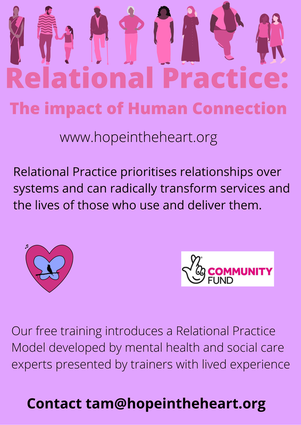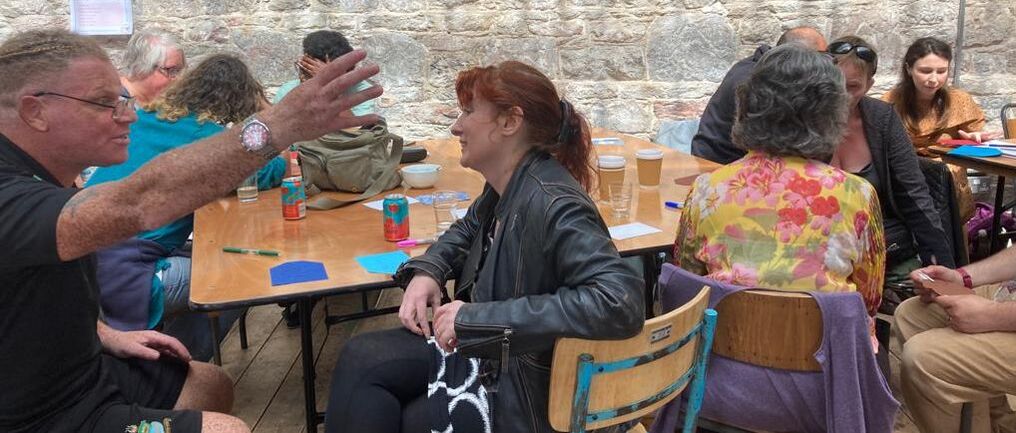
TRAINING FOR ORGANISATIONS AND SERVICE-PROVIDERS:
Sessions are in person and usually three hours, although this is negotiable. They are subsidised or free and can be tailored to your organisation's specific needs and interests. They can include selected artwork from the Messages from the HeART project
AN INTRODUCTION TO RELATIONAL PRACTICE
Hope in the Heart is collaborating with experts in the fields of mental health and social care to provide training to inspire a more compassionate way of working in areas including public services, businesses, third sector organisations. Relational practice has been shown to create greater efficiency and fulfilment in the workplace, leading to happier staff and service-users, with improved outcomes and productivity for all.
"Relational Practice is a way of working where establishing and maintaining a helpful interpersonal relationship is the priority. It requires:
• flexibility, adaptability and willingness
• an understanding of the inner and outer lives of individuals in the social field
• an enabling and facilitating attitude in developing our relational behaviour..." Rex Haigh, RCP and Nick Benefield UKDH
Sessions are in person and usually three hours, although this is negotiable. They are subsidised or free and can be tailored to your organisation's specific needs and interests. They can include selected artwork from the Messages from the HeART project
AN INTRODUCTION TO RELATIONAL PRACTICE
Hope in the Heart is collaborating with experts in the fields of mental health and social care to provide training to inspire a more compassionate way of working in areas including public services, businesses, third sector organisations. Relational practice has been shown to create greater efficiency and fulfilment in the workplace, leading to happier staff and service-users, with improved outcomes and productivity for all.
"Relational Practice is a way of working where establishing and maintaining a helpful interpersonal relationship is the priority. It requires:
• flexibility, adaptability and willingness
• an understanding of the inner and outer lives of individuals in the social field
• an enabling and facilitating attitude in developing our relational behaviour..." Rex Haigh, RCP and Nick Benefield UKDH
SELF-CARE AS RELATIONAL PRACTICE
Relational Practice must include the way we relate to ourselves, and this is especially important in challenging times. Our level of self-care also impacts the way we relate to others.
Service-providers committed to meeting the needs of others are at a high risk of exhaustion and burn-out, so our training includes a focus on the importance of prioritising and sustaining self-care.
All training aims to be informative, interactive inspiring and unique, with sustainable tools for achievable change. Bespoke workshops are available - please contact us to discuss.
Our trainers are all professionals with lived experience of mental health and social issues.
(Please contact [email protected] for more information or to book an event)
Relational Practice must include the way we relate to ourselves, and this is especially important in challenging times. Our level of self-care also impacts the way we relate to others.
Service-providers committed to meeting the needs of others are at a high risk of exhaustion and burn-out, so our training includes a focus on the importance of prioritising and sustaining self-care.
All training aims to be informative, interactive inspiring and unique, with sustainable tools for achievable change. Bespoke workshops are available - please contact us to discuss.
Our trainers are all professionals with lived experience of mental health and social issues.
(Please contact [email protected] for more information or to book an event)

AN INTRODUCTION TO RELATIONAL PRACTICE
In a society in which the bureaucracy of systems commonly takes priority over human connectedness, service-providers are frequently overwhelmed by targets, management and administrative tasks, and can lose sight of the real needs of their service-users - and themselves. Service-users may be frustrated, anxious, and engaged with a number of different services which operate in isolation, with little or no real communication between them.
Many people who access support services (and often those drawn to work within them) have experienced trauma, hardship and rejection. The impersonal impact of a systemic approach can be alienating and re-traumatising, ultimately increasing distress and disengagement.
Through this training we will explore together how a better knowledge and understanding of essential relational skills can significantly improve effectiveness and social impact within services and positively transform the experiences of both service-users and the providers committed to supporting them.
Interested or curious? PLEASE GET IN TOUCH
Contact [email protected] for more info, an informal chat, or to book.

With thanks to the National Lottery
Inspiring Change through Compassionate Connection

